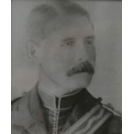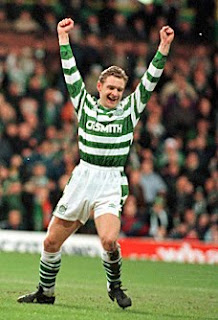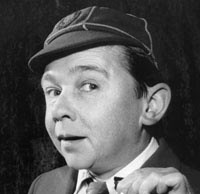Rangers are no more.
Not quite, of course. The football team - its home and its training facilities if not its players - has a new owner in a new corporate structure.
For now ownership lies with a consortium led by Charles Green. Tomorrow, next week, next month it might be a consortium led by Walter Smith.
Even after liquidation Rangers are haunted by uncertainty and tussled over by businessmen to the bewilderment of the ordinary fan.
But a new Rangers have indeed risen from the liquidated shell of the old company.
Where do they go now?
The decision that most SPL chairmen didn't want to make now lies with them.
Yes to the Rangers newco?
No to the Rangers newco?
It makes me worry about the business acumen available to Scottish football if it is indeed true that representatives of the other 11 clubs sat round a table and allowed themselves to be persuaded that Rangers didn't face the prospect of liquidation.
I suspect, however, it's far easier to convince an audience if they already want to believe what you're saying.
And how the SPL chairmen must have hoped that they didn’t have to make this choice.
Vote "yes" to a newco and stick with the comfort of familiarity.
Maybe the odd sanction to give an impression of resoluteness - or hope that the SFA do that for you - and then carry on as before.
Or vote "no" and take a step into the unknown.
When Rangers first went into administration I wrote that what is a simple moral decision for fans wouldn't necessarily be reflected by directors facing more complex debates about what their choice would mean for their own clubs.
That remains the case.
Fans have been vocal and overwhelming in their opposition to Rangers being allowed entry to the league.
Supporters are often out of step with their chairmen and directors. No SPL club is yet run as a democracy, these are not elected officials and more often than not what they feel is best for us and our clubs doesn't chime with the wishes of large sections of their "customer base."
But the strength of opinion here is perhaps unprecedented across the clubs. Can the men who will ultimately make the decision afford to ignore that?
Ramifications for the TV deal and other potential losses of income will influence their decision. The clubs themselves should be better acquainted with the consequences of refusing entry than anyone else.
And yes, protecting revenue streams is important. But the sheer scale of the financial folly at Rangers means that being seen to capitulate to a newco might have even graver consequences.
The idea of "sporting integrity" risks being cheapened by over use in recent weeks.
But if the other clubs are prepared to let Rangers back simply so they can chug along in the shadow of two dominant clubs, unable to stand on their own two feet, then the SPL can make no pretence at being a sporting entity anyway.
We've seen what greed and bad management can do to football clubs. Now should be a time to readjust.
I suspect that the scale of Rangers' wrongdoing, the lack of humility in the face of that wrongdoing, the "you'll die without us" attitude and the weight of public opinion is beginning to tip the balance against a newco.
I've also got a feeling that clubs struggling with their own finances won't buy the line that Rangers have been punished enough with a European ban, a ten point deduction and a period of emotional turmoil.
Fans of Rangers and fans of other clubs will always be at loggerheads on these issues but "we've been punished enough" is a bad argument to make.
It focuses attention on the litany of misdemeanours and leads the listener to the conclusion that contrition is unlikely to follow.
Rangers cocked-a-snook at corporate governance, stiffed their creditors and were gobbled up for pennies by a man who didn't see any problem in discussing transfer targets even as football debtors went unpaid.
It sends out a very dangerous message for the future of football governance in this country if a place is set for them and they are warmly welcomed back to the top table.
That is really not punishment enough.
The issue of football governance also means that the inquiry into alleged impropriety in player's contracts must be allowed to run its course.
The outcome of that investigation will tell us much about the health of the game in this country.
If a vote on the newco is taken before any findings are delivered then that vote will be compromised, a decision made without full possession of the facts.
Like everything else in this sorry saga the timescales are rushed, the details murky, the outcomes uncertain.
Should new Rangers be allowed into the SPL?
No.
Will new Rangers be allowed into the SPL?
Possibly.
A month ago I would have said they almost certainly would be. I think they still probably will be but it's no longer such a certainty.
The next few weeks are going to be messy, divisive and nasty.
Whatever the decision, for better or for worse, I suspect Scottish football will never be the same again.
The history issue
Does a newco retain the history of the oldco?
The findings of the current SPL investigation notwithstanding I find it unlikely that any directive is going to be issued from Hampden denying "new" Rangers the list of trophies won by "old" Rangers.
That won't stop fans of other clubs trying to deny fans of Rangers that history.
And it won't stop Rangers fans trying to deny fans of other clubs the right to deny them of that history.
A difficult one to be sure.
If you've watched Rangers at Ibrox for 20 years and plan to watch them at Ibrox for another 20 years I find it unlikely that you're going to consider 2012 a dividing line separating the achievements of the old and the new.
History in this case is surely subjective. Fans will bicker over this forever and a day but they'll only be bickering over a perception of whether this is "Year Zero" or not.
Your own perception might depend if you love Rangers or if you hate them. If you're stuck in the middle you'll probably just hear "blah, blah, blah."
I'm not sure the next time Hibs host Rangers I'll be thinking "Well, this is jolly nice, this is the first time we've met these boys in blue at Easter Road, I do hope we go on to forge a superior record to them in our head-to-head clashes."
I don't really think it works like that. Rivalry understandably inspires glee that Rangers' history will be wiped out. But it doesn't give anyone "control" of that history or someone else's interpretation of history.
(If the SFA were to offer guidance on this - and what could possibly go wrong if that august body starts wrestling with the philosophical issues involved in taking ownership of history - might I also suggest they bring in some governance on the issue of stars above badges which has, frankly, given over to anarchy in recent seasons.)
My own view?
If you ask me when Hibs were formed I'll say "6th August 1875."
I won't mention the period in the early 1890s when the club was forced into what we might call abeyance.
The timeline goes back to the beginning, skipping over the break.
The history of football clubs is a powerful thing and it has always been about more than decisions made in committee rooms, law courts or tax offices.
Like this? Like the Scottish Football Blog on Facebook.


